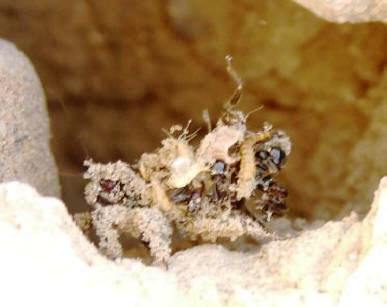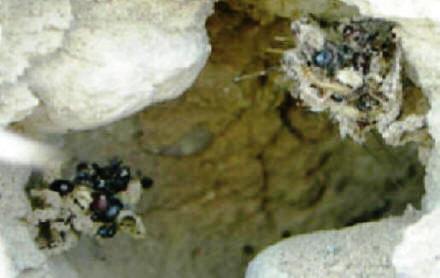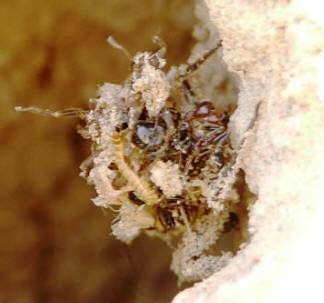<
>
AFGHAN ARABIA WILD
ARTICLES AND POSTS
WILDLIFE OF AFGHANISTAN
WILDLIFE OF
SAUDI ARABIA
NORTHWEST WILDLIFE ONLINE
THE STRANGEST CREATURE I EVER
ENCOUNTERED
John M. Regan
Since this article was written some time ago I
received information from Louis Sorkin B.C.E., Entomologist and
Arachnologist at the American Museum of Natural History in NY who identified
as most likely belonging to a group of insects called reduviid bugs. Bed
bugs are found in the family of insects, but not to worry. I found these
guys in an open field outside of an airbase in Kandahar. I did not bring
any specimens home with me.
I have wandered about
several continents photographing wildlife and during that time Iíve met some
truly fascinating animals.
Iíve worked with elephants and rhinoceroses in Asia,
spent some quality time with baboons in Saudi Arabia, and chased hyenas in
Afghanistan.
I had the opportunity to swim with alligators and catch monkeys
in Florida. Iíve
caught all kinds of reptiles and Iíve watched whales and dolphins from the
Pacific Northwest to Hawaii.
These were beautiful experiences and each of these
animals keeps its own special grip on my heart.
But the single most intriguing one of all is a tiny
thing I stumbled upon in the blazing desert of southern Afghanistan; something
I've yet to explain.
Kandahar, Afghanistan sits
on a wide plain at the base of the end of a mountain range that begins with the
towering Hindu Kush far to the northeast of the country.
These giants gradually taper down into brownish
boulderish, steep rolling hills to the north of the city and finally flatten out
into a plain that stretches to Iran and the southern border of Pakistan.
Animal life there is a collusion of Middle Eastern
desert creatures and Central Asian beasts that run from camels to hyenas.
A cheetah native to Afghanistan once roamed there and
still may in some unknown corner of this remote land.
The reptile fauna of this high desert environment is
considerable.
So many in fact, a snake once fell on my head as I opened the
door to my hut - but that's a story for another day.
Iíve photographed many
specimens.
My favorite activity on my day off was wandering about the
undeveloped areas of the giant Kandahar Air Base and filming the surprising
variety of wildlife that homesteaded inside this giant abode of military
hardware.
At the north and northwest end of the runway an undisturbed area
of several hundred acres of scrub and sand rolls out to the fenced in boundary
of the base and here I spent many delightful hours creeping about stalking my
little wild friends.
I usually undertook these jaunts in the morning and
early afternoons in order to avoid the crushing heat of midday.
But wildlife in all of its glory is not tied to the
habits of one man.
I wanted to see what kinds of creatures were out later
in the day, so late one afternoon I went back out, before dark but after the sun
had done its worst.
<
>
As daylight fell toward the
horizon I turned away from the ďlizard bedsĒ and headed back to my truck.
By habit I walk slowly with eyes focused on the ground
and keen for any movement.
Itís an effective technique and especially so on this
particular evening.
A very slight, almost negligible motion caught my
attention; so slight, in fact, that I thought I had seen little dust balls
pushed away from the percussion of my footsteps.
I stopped and looked closer.
Two or three of the little dust balls rolled into a
small hole about the size youíd expect for a tiny field mouse.
The motion was odd.
There was no wind.
Why would these dust balls all roll into the mouse hole?
I knelt down for a closer inspection.
What I saw astounded me.
The dust balls were actually tiny creatures.
There were about ten of the little gray beasts, all very
small; two of them could fit on the head of a thumb tack.
At first I assumed they were spiderlings, little guys
just leaving the nest.
But this was a strange behavior for baby spiders and
there was something unspiderlike about their appearance.
They did not resemble anything Iíd ever seen.
My camera, of course, was ready and I began shooting.
Soon they had retreated far into their hole and the
approaching darkness meant I had to leave quickly.
A military base in Afghanistan is not someplace to
wander in around after dark.
That was a shame.



Somebody please tell me what these odd little guys are.
Roughly the the size of a large spitball, I found about ten of them in the
Afghan desert inhabiting a small hole that you'd expect a tiny mouse to live in.
They only appeared in the evening, after the intense daytime heat dissipated.
Obviously insect like - note the legs grasping the side of their home - but
beyond that I have no idea what to call them. The legs are covered with
sand particles but the rest of the body is heavily decorated with insect body
parts, mainly ants from what I can see, a molt or an exoskeleton from some other
creature is obvious in the photos, too. This leads me to believe they are
some kind of ant predator, but I have never seen anything like them before.
Their habitat was unfortunately destroyed by a construction project over here
shortly after I took these photos. Despite an extensive search I've not
been able to find any more examples. If anyone knows what these
fascinating creatures are please contact me.
<
>
When I later developed the
photographs I was further amazed.
The photographs you see below are the sights that
greeted me.
Here was an insect like creature that apparently lives in a small
colony inside a burrow roughly as deep and wide as a quarter.
The bizarre things have covered themselves with body
parts from ants and other creature that I suspect make up its diet.
Ant heads, thoraxes, and abdomens are clearly visible.
The dried scaly skeleton of another invertebrate is
easily noted on one.
The creatureís bent, insect like legs are evident in the
picture and on careful observation what looks like antenna sprout above the
head.
Iíve seen many wonderful
specimens of wildlife in my life, but for the first time I had no idea what I
was looking at.
Iíd never seen anything like it before or since.
Subsequent trips to the same area were fruitless.
The evening light was not kind to the focusing abilities
of my digital camera and the little guys were never visible during the bright
hours of the day.
A week later the entire field was demined, meaning it
was plowed to a depth of two or three feet below the surface to rid the area of
mines.
(Yes, Iíd been walking around out there.)
Despite hours of determined searches I have never seen
these things again.
These pictures and my memory are all that remain Ė
unless somebody out there tells me what these guys are!
HOOAH
Jack
AFGHAN ARABIA WILD
ARTICLES AND POSTS
WILDLIFE OF AFGHANISTAN
WILDLIFE OF
SAUDI ARABIA
NORTHWEST WILDLIFE ONLINE
<
>